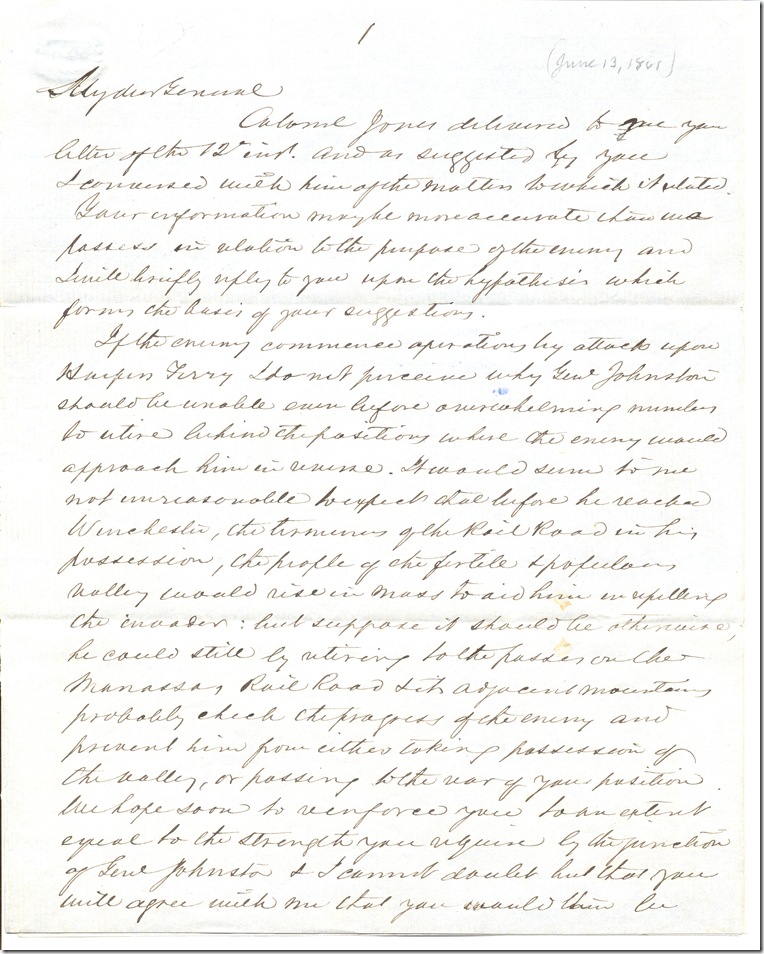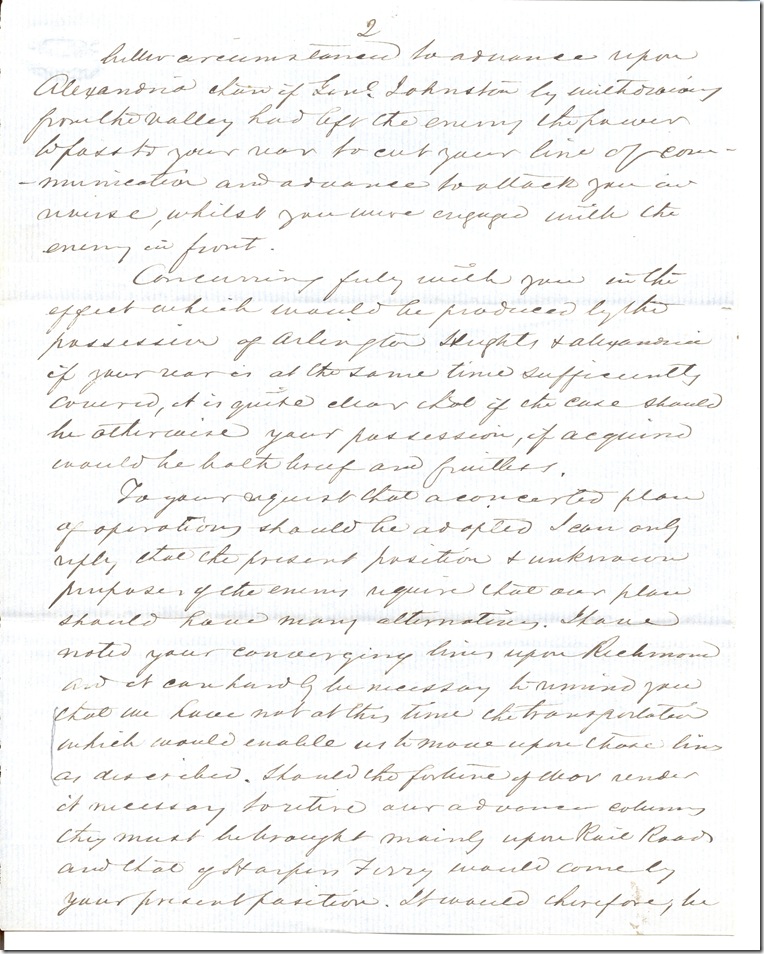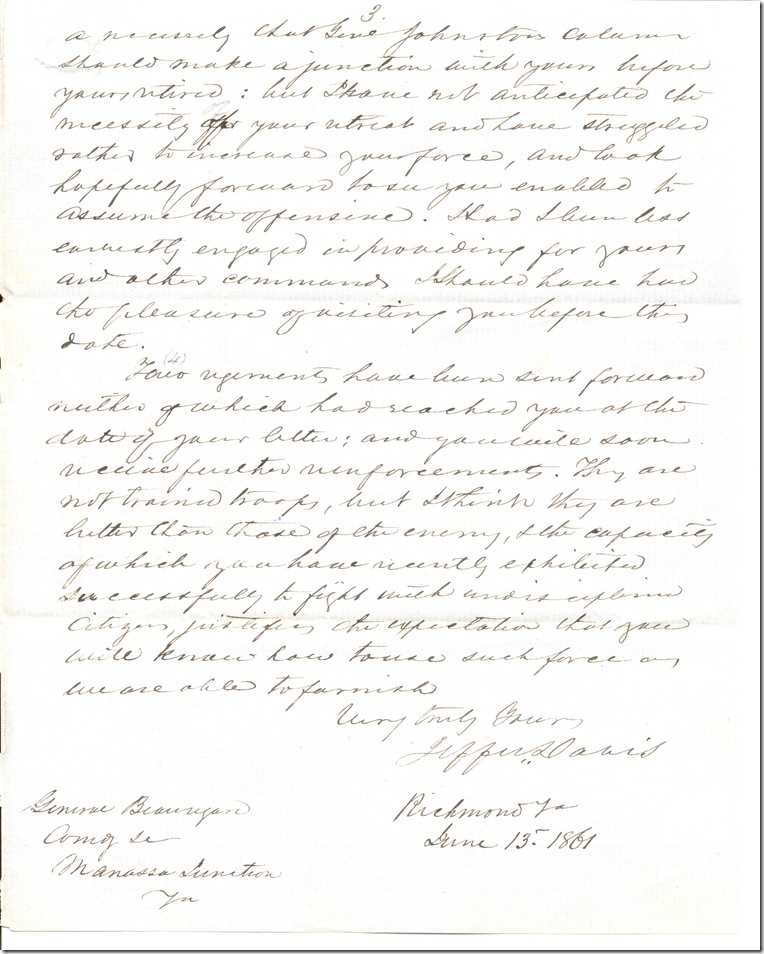Pierre Gustave Toutant Beauregard was a Louisiana-born general of the Confederate States Army. He had graduated second in his class from West Point in 1838 and was an admirer of Napoleon. He achieved fame early in the Civil War for commanding the Fort Sumter bombardment and as the victor of the first battle of Manassas. He later served in the Western Theater (including Shiloh and Corinth), Charleston, and the defense of Richmond, but his career was hampered by friction with Jefferson Davis and other generals.
Transcript:
My dear General,
Colonel Jones delivered to me your letter of the 12th inst. and as suggested by you I conversed with him of the matters to which it stated.
Your information may be more accurate than we possess in relation to the purpose of the enemy and I will briefly reply to you upon the hypothesis which forms the basis of your suggestions.
If the enemy commence operations by attack upon Harper’s Ferry I do not perceive why Genl Johnston should be unable even before overwhelming numbers to retire behind the positions where the enemy would approach him in reverse. It would seem to me not unreasonable to expect that before he reached Winchester, the terminus of the Rail Road in his possession, the people of the fertile & populous valley would rise in mass to aid him in expelling the invader: but suppose it should be otherwise, he could still by retiring to the passes on the Manassas Rail Road & its adjacent mountains probably check the progress of the enemy and prevent him from either taking possession of the valley, or passing to the rear of your position. We hope soon to reinforce you to an extent equal to the strength you require by the junction of Genl Johnston & I cannot doubt but that you will agree with me that you would then be better circumstanced to advance upon Alexandria then if Genl Johnston by withdrawing from the valley had left the enemy the power to pass to your rear to cut your line of communication and advance to attack you in reverse, whilst you were engaged with the enemy in front.
Concurring fully with you in the effect which would be produced by the possession of Arlington Heights & Alexandria if your rear is at the same time sufficiently covered, it is quite clear that if the case should be otherwise your possession, if acquired would be both brief and fruitless.
To your request that a concerted plan of operations should be adopted I can only reply that the present position & unknown purposes of the enemy require that our plans should have many alterations. I have noted your converging lines upon Richmond and it can hardly be necessary to remind you that we have not at this time the transportation which would enable us to move upon those lines as described. Should the fortune of War render it necessary to retire our advance columns they must be brought mainly upon Rail Road and that of Harpers Ferry would come by your present position. It would therefore be a necessity that Genl Johnstons column should make a junction with yours before yours retire: but I have not anticipated the necessity of your retreat and have struggled rather to increase your forces, and look hopefully forward to see you enabled to assume the offensive. Had I been less earnestly engaged in providing for yours and other command I should have had the pleasure of visiting you before this date.
Two regiments have been sent forward neither of which had reached you at the date of your letter: and you will soon receive further reinforcements. They are not trained troops, but I think they are better than those of the enemy, & the capacity of which you have recently exhibited successfully to fight with and under experienced citizens, justifies the expectation that you will know how to use such forces as we are able to furnish
Very truly yours
Jeffers. Davis
Citation: Jefferson Davis (1808-1889), letter signed to G.T. Beauregard. Richmond, 13 June 1861. AMs 356/25.2


